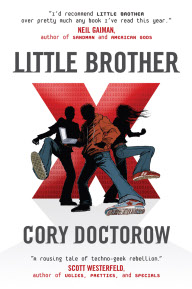 | |
| Author | Cory Doctorow |
|---|---|
| Language | English |
| Subject | terrorism, cryptography, computer hackers, Department of Homeland Security, privacy (privacy in education), police state |
| Genre | dystopian young adult fiction |
| Published | April 29, 2008 (Tor Teen) |
| Publication place | United States |
| Media type | Book |
| Pages | 380 |
| ISBN | 978-0-7653-1985-2 |
| OCLC | 176972381 |
| LC Class | PZ7.D66237 Lit 2008 |
| Followed by | Homeland |
Little Brother[1] is a novel by Cory Doctorow, published by Tor Books. It was released on April 29, 2008.[2] The novel is about four teenagers in San Francisco who, in the aftermath of a terrorist attack on the San Francisco–Oakland Bay Bridge and BART system, defend themselves against the Department of Homeland Security's attacks on the Bill of Rights. The novel is available for free on the author's website under a Creative Commons license (CC BY-NC-SA), keeping it accessible and remixable to all.[3]
The book debuted at No. 9 on The New York Times Best Seller list, children's chapter book section, in May 2008.[4] As of July 2, it had spent a total of six weeks on the list, rising to the No. 8 spot.[5] Little Brother won the 2009 White Pine Award,[6] the 2009 Prometheus Award.[7] and the 2009 John W. Campbell Memorial Award. It also was a finalist for the Hugo Award for Best Novel.[8] Little Brother received the Sunburst Award in the young adult category.[9]
The New York Times says, "'Little Brother' isn't shy about its intent to disseminate subversive ideas to a young audience." The novel comes with two afterword essays by cryptographer and computer security specialist Bruce Schneier, and hacker Andrew "bunnie" Huang, and has a bibliography of techno-countercultural writings, from Jack Kerouac's On the Road to Schneier's "Applied Cryptography".[10]
Hacker Peiter Zatko stated that the book is now used as training material for new NSA recruits in order to give them a different point of view.[11]
- ^ Doctorow, Cory. Little Brother. New York: Tor Teen, 2008
- ^ Release date.
- ^ Doctorow, Cory. "Little Brother > Download Free". Retrieved 2008-08-11.
- ^ Children's Books – New York Times, May 5, 2008.
- ^ Children's Books – New York Times, July 6, 2008.
- ^ "White Pine Award list of winners". Archived from the original on 2011-09-30. Retrieved 2009-07-08.
- ^ "Prometheus Award Press Releases". Archived from the original on 2009-03-27. Retrieved 2009-07-08.
- ^ "AnticipationSF Hugo Finalist list". Retrieved 2009-07-08.
- ^ "Awards and Announcements". Resource Links. Retrieved 16 May 2013.
- ^ Grossman, Austin (September 14, 2008). "Nerd Activists". The New York Times.
- ^ Archived at Ghostarchive and the Wayback Machine: "Defcon 21 – Unexpected Stories – From a Hacker Who Made It Inside the Government". YouTube.